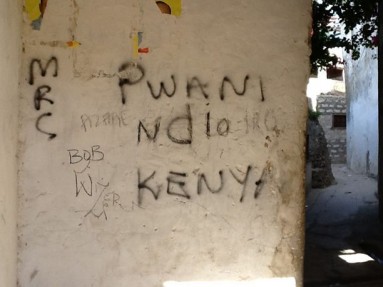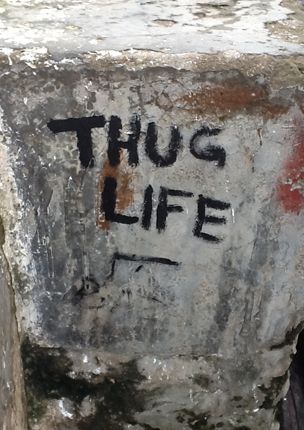Tena mwanangu idhili,
Mbee za makabaili,
Uwaonapo mahali,
Angusa kuwenukiya.Further, my child,
humble yourself,
before people of rank,
when you see them anywhere,
quickly praise them.--Mwana Kupona binti Msham, 19th Century Lamu Poet, Advice To Her Daughter (1858)
Fifty years after independence, in all the 6,300 square kilometres of Lamu county, there is not a single paved road. This is a problem. If you are one of the 36,000 residents of the Lamu archipelago, you need to go to Malindi, the nearest town on the mainland, for a dentist, an optician, most medications, surgery, to get your laptop fixed, higher education, technical training, industrial equipment, kitchen appliances. Women who develop complications during childbirth are sent to Mpeketoni, the nearest mainland town at the centre of the resettlement scheme of Kikuyus at the coast, whose influx displaced the indigenous hunter-gatherer Sanyes. The Mpeketoni hospital is better equipped, staffed, and serviced than any in Lamu. At Mpeketoni, they are often told to go to Malindi. They often die in transit. The Saudis built a state-of-the art hospital, the King Fahd hospital, on the island of Lamu. But neither the Saudis nor the government of Kenya keep the hospital stocked with drugs, supplies, or medical staff. So its primary activity is referring patients to facilities on the mainland.
On June 4th, 2013, Police in Mtwapa town in Kilifi county arrested a German national and nine local women for allegedly stripping in a club in Mtwapa.
Kenyatta directed coastal residents that what was left of the trust lands would be established as settlement schemes for their benefit. However, without following due procedures of law, he again took part of whatever remained for himself and his relatives. He also demanded that local communities that should have benefited from the trust lands accept payment of KSh600 per acre.
According to police the ladies were arrested while dancing naked for clients at Bahnhof pub and restaurant situated along the Mombasa–Malindi highway.
When the locals declined to accept the money, Kenyatta told them that whether or not they accepted it, the remainder of the trust lands would go to the government.
Kilifi police boss Clement Wangai said their arrest followed complaints from area residents over indecent acts at the club owned by the German national Ian Huthson.
That is how President Kenyatta took all of Tiwi and Diani trust lands. Local people became ‘squatters’ on the land and were evicted.
The nine women each pleaded guilty to the charge of indecent exhibition.
By 2012, land in the former trust lands taken by Kenyatta fetched KSh15 million per acre.
The nine women were sentenced to fines of 5,000 shillings each or a 3-month jail term, for ‘engaging in prostitution.’
There is one channel between the main Lamu island and all the other islands in the archipelago, inhabited by over 12,000. A daily ferry plies this channel, known as Mkanda, sometimes as heavily loaded as a road vehicle, people hanging off the top and the sides. Small boats run water, supplies, humans, between the islands. There is no fresh water on the other islands. Locals harvest rainwater on large cement floors, jalbia, which are tilted to run off into storage tanks. In the weeks before the rains at the end of the dry season, when all water stores have been exhausted, you can see young men forming human chains, passing jerry-cans of water from hand to hand down to boats on the seafront, for transport to the smaller islands. These sell for up to 60 shillings a jerry-can, a punishing expense for families who eke out a living from fishing, subsistence farming, hunting, and gathering.
The proposed Lamu Port-South Sudan-Ethiopia Transport Corridor (LAPSSET), is the most ambitious transport project in modern history of the continent. It will cost $23 billion. In 2008, the government of Qatar agreed to finance the entire project in exchange for 100,000 acres of fertile land in the Tana River Delta, where it could grow food for Qataris. Debate and opposition ensued. Qatar pulled out, but the displacement and land grabbing in Tana Delta has turned it into a living hell, caused hundreds of deaths.
The port will link Lamu to the oilfields of Southern Sudan via two oil pipelines, one for crude and one for refined. It will be the largest port on the African continent. Oil pipelines are no fun for the people who live along them. Just ask the residents of the Niger Delta.
No one has asked the Wa'amu if they want to live with oil spills, petroleum fires, the poisoning of their soil, air and precious scarce water. The plans for the construction of the new Lamu Port will block access to the Mkanda channel for three years while the harbor is dredged to make it deep enough for huge container ships. The channel will be completely closed as a transport route. The planners did not consult the local people.
The alternate route will go around the outside of the islands, in the open ocean, exposed to the full force of winds and currents. At least four times longer than the Mkanda crossing, the route will be impossible for small boats, a route that would capsize the Lamu ferry on a rough day, and be high-risk on a smooth day. The Lamu Port Steering Committee, made up of prominent locals, first heard of this plan five weeks ago, at a community activist meeting.
When a Lamu dhow captain, whose ancestors have sailed these waters for generations, was told of the plan, he refused to believe it. Impossible he said. People will die.
Raila Odinga, leader of the Opposition, came to Lamu twice before the election. He told the people of Lamu that they were stupid to have reservations about the port. Don't you want to be Dubai, he demanded.
No questions were allowed. No time was allotted for a local leader to respond. Luck only knocks once at your door, said Raila. He liked this line. He repeated it.

